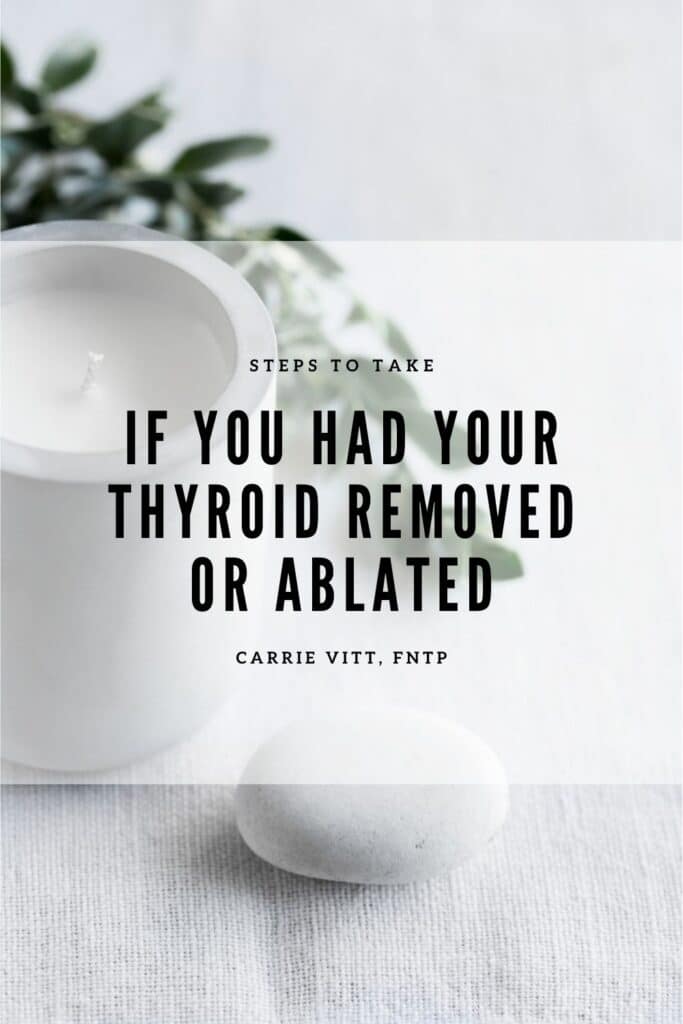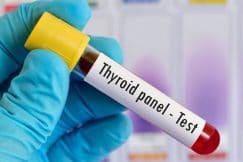Are there steps you can take to feel better if you had your thyroid removed or if you had it ablated? While you’ll definitely need to be on medications, there are still so many things you can do to support the other parts of your endocrine system, support detoxification, reduce symptoms and feel better!

What happens when you don’t have a thyroid or your thyroid doesn’t produce hormones (the 30,000 ft. view):
While there are many various kinds of thyroid hormones, the two main thyroid hormones to be aware of that your body now can’t make are fT4 and fT3. fT4 is produced by the thyroid and then most of it is sent to the liver to be converted into fT3.
When the thyroid has been ablated or removed, it’s imperative that you talk to your doctor about the correct dose of t4 and t3 medications so that your body has these two essential hormones.
There are some thyroid hormones and other thyroid levels that you can influence with your diet and lifestyle.
Here are some examples:
TSH – TSH is a pituitary hormone, and while it does rely on feedback from fT4, you can also help keep it in balance by taking steps to balance your adrenals (more info on that below). Nine times out of ten, when TSH is elevated it’s from an imbalance in the adrenals. And, if it’s elevated, it’s either from an imbalance in the adrenals and/or toxicity somewhere in the body.
TPOab – TPO antibodies are an immune system issue, not a thyroid issue. Thankfully, there are dozens of things you can do to improve antibodies!
TgAB – TgAB antibodies are also an immune system issue, not a thyroid issue, and there are steps you can take to improve them.
TSI – TSI antibodies are usually present when someone has Graves’ disease. This is an immune system issue, not a thyroid issue, so once again, there are lots of things you can do to improve them!
rT3 – This is a hormone that goes up when there is excess cortisol (aka stress) in the body. When rT3 goes up, this can suppress the immune system, lower fT3, raise or lower TSH, create nutrient deficiencies, etc. So, it’s really important to keep stress in check!
You can also take steps to balance your blood sugar, balance your adrenals, reduce elevated cholesterol, improve digestion, detox, etc.
Here are steps I recommend taking if you had your thyroid removed or ablated:
1. Support your adrenals – this is probably the most important step you can take because adrenal imbalance can cause a wide variety of different symptoms such as:
A tendency to be a night person
Hair loss
Having difficulty falling asleep
Waking up in the middle of the night with difficulty falling back asleep
A slow starter in the morning
Feeling keyed up and having trouble calming down
Low blood pressureHeadaches after exercising
Clenching or grinding your teeth
Chronic low- or middle-back pain
Difficulty maintaining chiropractic adjustments
Craving salty foods
Perspiring easily
>Chronic fatigue or getting drowsy often
Afternoon yawning
Afternoon headache
Anxiety
Panic attacks
Seasonal or chronic allergies
Pain on the medial (inner) side of the knee or knees
Needing to wear sunglasses
Dizziness when you stand up
Difficulty losing weight
Gaining weight around the waistline
Getting upset or angry easily
Click here to learn 20 steps you can start taking today. I also have a free class about how to use essential oils to support your adrenals.
2. Eat a nutrient dense diet – the foods you eat are a big factor in the health of the entire body. The right foods can help support your endocrine system, balance blood sugar, reduce digestive issues, and so much more. Click here to read about the diet I recommend.
3. Keep an eye on your TSH levels – TSH is a hormone that the pituitary sends out to tell the thyroid how much or how little thyroid hormones to produce. Some of this is dependent on the levels of fT4 in the body, but not always. In general, TSH levels tell you what your pituitary is up to, but it’s not telling you what the thyroid is doing.
Everyone is biochemically individual, but in our practice we’ve found that a TSH level between 0.5-2.0 is the range where people feel healthy and vibrant.
The pituitary, hypothalamus and adrenals (also called the HPA axis) are all part of the endocrine system and communicate with one another throughout the day. When the body perceives stress – emotional, mental, physical, environmental, mental, stress from disease, etc. – this creates an imbalance in the HPA axis. For some people, this will cause the pituitary to create more TSH, and for some it will create less.
So, a high or low TSH level isn’t exactly a thyroid problem. Instead, there’s usually some sort of imbalance in the HPA axis. Your practitioner’s job is to now figure out why there is an imbalance.
If your thyroid has been removed or ablated, sometimes the stressor that this is causing on the body could be enough to throw off TSH levels.
4. Support your liver – The liver is one of the primary detox organs in the body and is responsible for over 500 functions in the body. It’s also the master transformation site that filters toxins from the blood to neutralize and eliminate them. These toxins can include: synthetic chemicals, excess hormones, heavy metals, sugar, processed foods, etc.
Signs that you may have some liver congestion:
Grey circles under or around the eyes
Bloodshot eyes
PMS symptoms
Menopause symptoms
Blood sugar imbalance
Under conversion of T4 to T3
Liver disease
Itchy skin, hives, or other rashes
Waking up with night sweats
Hormone imbalance
Chemical sensitivity
Dark spots on the cheeks and/or around the eyes (commonly known as liver spots)
Nausea
Estrogen dominance
Above all, remember that detox is a process, not an event. So it’s best to incrementally change some of your daily habits to enable your liver to function at its optimum capacity over time.
Click here to learn about 8 ways you can detox your liver naturally.
5. Take steps to ensure proper stomach acid production – If you have digestive issues such as heartburn, indigestion, bloating, gas, burping, undigested food in your stool, candida, SIBO, leaky gut, etc. it’s imperative that you take steps to increase proper stomach acid production.
When the stomach doesn’t make enough stomach acid, then the body cannot use the nutrients in food. This can create hormone imbalance, adrenal imbalance, stress in the body, nutrient deficiencies, etc. Click here for steps you can take.
6. Aim to get 8-9 hours of sleep each night – sleep is a time when our bodies rest, repair, heal and detoxify. If you’re struggling with insomnia, click here for tips.
7. Reduce stress – too much stress in the body, especially for extended periods of time, can cause digestive issues, hormone imbalance, heart disease, adrenal imbalance, or autoimmunity.
While we can’t always get away from the stressors in our lives, it’s important that we take steps so we can better handle and react to the stress we are currently experiencing.
How to help reduce the stress response in the body:
Get outside daily
Exercise daily
Meditate – I’ve found the apps Headspace, Soulspace, Abide and Calm very helpful.
Pray and read the Bible
Talk to a friend, family member or counselor about the stressors in your life
Take an epsom salt bath a few times a week
I think it’s also important to note that not having a thyroid is an inherent stressor on the body. So, it’s important from here on out to take extra steps to take care of yourself.
8. Antibodies – reducing thyroid antibodies is a very multi-layered process, and it’s important to understand that antibodies are an immune system issue, not a thyroid issue. It is very possible to reduce antibodies if you don’t have a thyroid, or if your thyroid doesn’t produce thyroid hormones.
As I mentioned, this a very multi-layered process, so to get headed in the right direction, I recommend following steps 1-8 for at least six to nine months.
If you would like to access my 90-day protocol for balancing your hormones, blood sugar, adrenals, improve digestion, reduce antibodies, etc. I recommend checking out my Thyroid Support and Health online course. It’s written for anyone with any kind of thyroid disease, and for those without a thyroid.





10 Comments